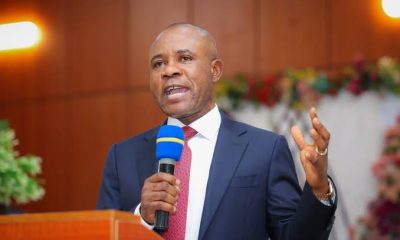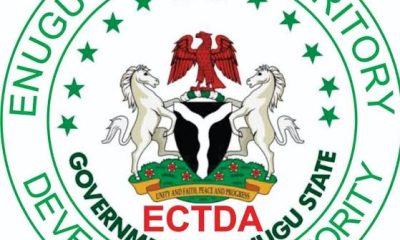News
Fuel subsidy removal: Gov. Mbah inaugurates committee on palliatives

Gov. Peter Mbah of Enugu State has rolled out palliatives to mitigate the harsh economic effects of the recent removal of fuel subsidy by the Federal Government on residents of the state.
He stressed that his government felt the pains the people were passing through.
The governor disclosed this on Monday in Enugu while inaugurating a committee for the procurement, storage and distribution of the relief items to the public.
He charged members of the committee, chaired by the Deputy Governor, Mr Ifeanyi Ossai, to handle the palliatives with transparency, while ensuring the speedy distribution of the items to those in dire need of them.
Also, members of the committee include the chairman, Association of Local Governments in Nigeria (ALGON), Enugu State, and Chairman of Nkanu East Council Area, Mr Okechukwu Edeh.
ALGON Deputy Chairman and Chairman of Uzo Uwani Council Area, Mr Chukwudi Nnadozie, Chairman of Awgu Council Area, Mr Pedro Nwankwo and his Enugu East counterpart, Mr Livinus Anike are also members.
Others are the Special Adviser to the Governor on Agriculture, Mike Ogbuekwe, Programme Manager of Enugu State Agricultural Development Programme (ENADEP), Dr Ogbonna Onyeisi, and the head of the State Emergency Management Agency (SEMA), Chinasa Mbah.
Mbah who acknowledged the harsh impact of the fuel subsidy on the people, further said that the subsidy removal, would, however, immensely benefit Nigerians in the long run.
While maintaining that he shared in the pains Nigerians were going through at the moment, Mbah expressed the hope that the palliatives would help alleviate their hardships.
He also enjoined the committee to spare no time in ensuring that the palliatives were sent to “homes of those that need them the most in the state”.
He said, “You recall that few months ago the Federal Government of Nigeria removed the fuel subsidy. And as you know, that came with pains, shared pains, even though we believe in the long run, it will be beneficial to the country.
“The question for us now as leaders is, how do we mitigate those shared pains that our people are going to be exposed to? It is part of what we are doing to see how we can begin to cushion the effects of some these pains.
“So, what we are doing now is to see how to fix the pains people are going through and there are also plans for short and medium term solutions, and that we are going to do in due course.”
The governor further charged the committee to ensure that the palliatives got to the people who deserved it and also ensure it was distributed with speed and transparency.
Responding on behalf of the committee members, Ossai expressed the committee’s readiness to deliver on the assignment and work with the template given to them in ways that would reflect transparency.
He appreciated the governor for meeting the yearnings of the people, even as he assured that the committee would not disappoint in the discharge of their responsibilities.
News
Woman killed while crossing road in Anambra

The Federal Road Safety Corps (FRSC), Anambra State Sector Command, has confirmed the death of a woman in an accident at Okpoko Market on the Asaba-Onitsha Road.
The Sector Commander, Mr Adeoye Irelewuyi, who confirmed the accident to journalists in Awka on Thursday, said that the woman was hit while she was crossing the road.
He said that the accident, which occurred on Wednesday, involved a commercial tow truck with registration number XA550BMA.
“Eyewitness report reaching us indicates that the truck was towing a vehicle in an uncontrollable speed along the axis.
“The vehicle that was being towed got detached from the tow truck.
“It hit and killed a female adult, who was said to be crossing the road, while the tow truck continued its movement.
“FRSC rescue team came to the scene and took the woman to Toronto Hospital, Onitsha, where she was confirmed dead and her body deposited at the hospital’s mortuary,” he said.
While sympathising with the family of the dead, the sector commander urged motorists, especially tow truck drivers, to exercise a high level of professionalism.
He also urged the drivers to always use standard equipment and avoid speeding.
News
LASG’s maize palliative impactful, says poultry association chair

The Chairman, Poultry Association of Nigeria (PAN), Lagos State Chapter, Mr Mojeed Iyiola, said the state government’s maize palliative to members of the association made a positive impact on the sector.
Iyiola said this in an interview with the News Agency of Nigeria (NAN) on Thursday in Lagos.
“We received about 150,000 tons of maize in February from the Lagos State government as palliative to cushion the effect of high feed prices.
“The major benefit of the palliative is that it actually cushioned the cost of production for most poultry farmers in the state.
“The palliative was beneficial as it made the cost of some poultry produce, especially eggs to drop,” Iyiola said.
He noted that prior to the palliative, a crate of egg was sold between N3,500 and N3,700 at the farm gate, but after the palliative, it now sells between N3,200 and N3,400.
According to the PAN chair, retailers and middlemen who sell from N3,800 to N4,200 do that for their personal gain.
“We have urged our members to sell their eggs at reasonable prices following the receipt of the palliative from the government.
“We appreciate the Lagos State government for the palliative but we also urge the federal government to do likewise, to further reduce the cost of production in the sector.
“This will consequently lead to drop in the prices of all poultry produce across board,” he said.
He said the palliative was shared among financial members of the association at no extra cost.
“As an association we shared the grains equally across PAN’s eight zones in the state equally. We also mandated each zone not the sell even a grain of the maize.
“We, however, considered new poultry farmers who wanted to the join the association as beneficiaries of the palliative,” said Iyiola.
He noted that through the palliative, more poultry farmers were recruited into the association.
“The maize was shared only to poultry farmers and not feed millers, it is the major component of poultry feed formulation,” he said.
















